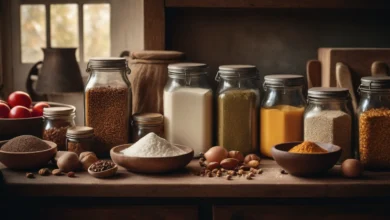Powerful Household Tricks to Soothe Muscle Pain: Quick and Effective Relief at Home

Muscle pain can be incredibly disruptive, whether it’s the result of a long workout, an injury, or simply the wear and tear of daily activities. While muscle pain can range from mild discomfort to intense soreness, relief doesn’t always require a trip to the pharmacy. Fortunately, many common household ingredients and practices can provide fast and effective relief from muscle pain, all from the comfort of your home. In this article, we’ll explore powerful household tricks that can soothe muscle pain, ease inflammation, and promote faster healing.
1. Epsom Salt Bath – A Soothing Soak for Sore Muscles
Epsom salt has long been used for muscle relaxation due to its high magnesium content. Magnesium helps to relax muscles and ease pain, while the warm water helps increase blood circulation and reduce stiffness.
How to Use:
Fill your bathtub with warm water and add 2 cups of Epsom salt. Soak for 15-20 minutes, allowing the magnesium to penetrate your muscles. This can help alleviate soreness and reduce inflammation.
2. Ice and Heat Therapy – Dual Action for Fast Relief
Switching between hot and cold compresses is an effective way to manage muscle pain. Ice reduces inflammation and numbs the pain, while heat helps relax tight muscles and improve blood circulation, speeding up the healing process.
How to Use:
For acute injuries or inflammation, apply an ice pack wrapped in a towel for 15-20 minutes at a time. After the first 48 hours, switch to heat, using a warm compress, heating pad, or warm towel for 15-20 minutes. Repeat the cycle a few times a day.
3. Turmeric – Nature’s Powerful Anti-Inflammatory
Turmeric contains curcumin, a compound known for its powerful anti-inflammatory and antioxidant properties. When consumed, turmeric can reduce swelling and provide relief from muscle pain caused by inflammation.
How to Use:
Add a teaspoon of turmeric powder to a glass of warm milk or water, and drink once or twice a day. You can also use turmeric topically by mixing turmeric powder with coconut oil to create a paste and applying it directly to the affected area. Leave it on for 20-30 minutes before rinsing off.
4. Ginger – A Natural Pain Reliever
Ginger is another powerful anti-inflammatory herb that can provide relief from muscle pain. It helps reduce soreness, inflammation, and stiffness by improving blood circulation and reducing swelling.
How to Use:
You can make ginger tea by steeping fresh ginger slices in hot water for 10 minutes. Drink it twice a day. Alternatively, ginger oil or ginger paste can be massaged into sore muscles for direct relief.
5. Peppermint Oil – Cooling and Pain-Relieving Effects
Peppermint oil is known for its cooling sensation and pain-relieving properties. When applied topically, it stimulates blood circulation and can relieve muscle pain and tension.
How to Use:
Mix a few drops of peppermint oil with a carrier oil, such as coconut or olive oil, and massage it into the affected area. You can also dilute peppermint oil in a warm bath to soothe muscles.
6. Massage – A Simple and Effective Relief Method
Gentle massage can significantly ease muscle tension and reduce pain by increasing blood flow to the affected muscles. Whether you do it yourself or get help from a partner, massaging the sore areas can help promote faster healing.
How to Use:
Use your fingers or a foam roller to gently massage the sore muscles in circular motions. Apply light pressure to avoid further irritation. You can also use essential oils like lavender or eucalyptus during your massage for added soothing effects.
7. Apple Cider Vinegar – A Versatile Muscle Soother
Apple cider vinegar (ACV) is packed with minerals that help balance the body’s pH, reduce inflammation, and relieve muscle pain. Its alkalizing properties can neutralize acids that may be contributing to soreness.
How to Use:
Mix two tablespoons of apple cider vinegar with a glass of warm water. Drink it once a day to reduce muscle pain and inflammation. Alternatively, you can soak a cloth in a mixture of ACV and warm water and apply it to the sore area for 15-20 minutes.
8. Arnica – The Herbal Remedy for Muscle Pain
Arnica is a well-known herbal remedy that has been used for centuries to treat bruising, muscle pain, and swelling. It contains anti-inflammatory compounds that help reduce soreness and promote faster healing.
How to Use:
Apply arnica cream or gel directly to the affected area 2-3 times a day. You can also take arnica supplements, but it’s important to consult with a healthcare provider before doing so.
9. Magnesium Oil – A Topical Solution for Muscle Relaxation
Magnesium plays an important role in muscle function and can be effective in reducing muscle cramps and spasms. Magnesium oil is a highly absorbable form of magnesium that can be applied directly to the skin.
How to Use:
Spray magnesium oil onto sore muscles, then massage it gently into the skin. Do this daily before bed for maximum relief. You can also use magnesium bath salts for a relaxing soak.
10. Warm Compress with Essential Oils – Relaxing and Healing
A warm compress infused with essential oils can provide deep muscle relaxation and relieve pain. Essential oils like lavender, eucalyptus, and rosemary are especially helpful in soothing muscle discomfort.
How to Use:
Fill a bowl with warm water and add 2-3 drops of your favorite essential oil. Soak a cloth in the water, wring it out, and apply it to the sore area. Leave it on for 10-15 minutes for the best results.
Frequently Asked Questions About Muscle Pain Relief
1. How long does it take for muscle pain to go away?
The duration of muscle pain depends on the cause and severity. Mild soreness usually resolves within a few days, while more severe pain from injury or strain may take longer to heal. Regular use of these household remedies can speed up the healing process.
2. Can I combine these treatments?
Yes, combining these treatments can enhance relief. For example, you can alternate between using a heat compress and applying turmeric or ginger for internal pain relief. Just make sure not to overuse any one remedy.
3. Are these remedies safe for everyone?
Most natural remedies are safe, but if you have allergies, skin sensitivities, or underlying health conditions, it’s important to use caution. Always perform a patch test before applying essential oils or other products to your skin, and consult a healthcare provider if you have concerns.
Conclusion
When it comes to soothing muscle pain, natural remedies from your household can offer fast, effective relief without the need for harsh chemicals. Whether it’s through soothing Epsom salt baths, anti-inflammatory turmeric, or the cooling effects of peppermint oil, these simple tricks can help reduce soreness, promote healing, and keep you comfortable. Incorporating these remedies into your routine can offer lasting relief and help you get back to feeling your best in no time.





